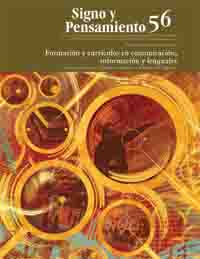Abstract
Sixteen years after Law 100 was passed, the national health system is unable to guarantee the fundamental right to life to all Colombians. In recent years, this permanent claim has been covered by the media, which has given high visibility to this topic of public debate: this is shown through a study sample consisting of 1,265 items collected between March 1st and June 30th, 2007, from 14 national and regional newspapers and TV news reports. Even though efforts to improve information-coverage standards are evident, high quality levels are still to be attained. The logic of information follows globalization patterns, which often causes commercial interests to prevail over preventive coverage. As a result, the media end up favoring health care privatization politics.
Calvo Hernando, M. (2002), “El periodismo científico, reto en las sociedades del siglo xxi”, en Comunicar, núm. 19, pp. 15-18.
Elías, C. (2008), Fundamentos de periodismo científico y divulgación mediática, Madrid, Alianza.
Fuller, J. (2002), Valores periodísticos. Ideas para la era de la información, Buenos Aires, La Crujía.
Gutiérrez, L. (2006), “Análisis de la calidad informativa, primer paso hacia el cambio”, en Revista Palabra Clave, núm. 9, pp. 29-56.
Kovach, B. y Rosenstiel, T. (2003), Los elementos del periodismo, Madrid, El País.
McQuail, D. (1998), La acción social de los medios. Los medios de comunicación y el interés público, Buenos Aires, Amorrortu.
Organización Panamericana de la Salud, Organización Mundial de la Salud y Federación Latinoamericana de Facultades de Comunicación Social (Felafacs), (2002), Hacia la formación de periodistas en salud. Bases curriculares para América Latina, Lima.
Pellegrini, S. (1999), “La medición de la calidad de la prensa en Chile”, en Cuadernos de Información, núm. 13, pp. 49-55.
Perelman, C. (1997), El imperio retórico. Retórica y argumentación, Bogotá, Norma.
Petracci, M. (2004), Salud, derechos y opinión pública, Bogotá, Norma.
Riffe, D. y Stephen, L. (1998), Analyzing Media Messages. Using Quantitative Content Analysis in Research, Mahwah (NJ), Lawrence Erlbaum Associates.
This journal is registered under a Creative Commons Attribution 4.0 International Public License. Thus, this work may be reproduced, distributed, and publicly shared in digital format, as long as the names of the authors and Pontificia Universidad Javeriana are acknowledged. Others are allowed to quote, adapt, transform, auto-archive, republish, and create based on this material, for any purpose (even commercial ones), provided the authorship is duly acknowledged, a link to the original work is provided, and it is specified if changes have been made. Pontificia Universidad Javeriana does not hold the rights of published works and the authors are solely responsible for the contents of their works; they keep the moral, intellectual, privacy, and publicity rights.
Approving the intervention of the work (review, copy-editing, translation, layout) and the following outreach, are granted through an use license and not through an assignment of rights. This means the journal and Pontificia Universidad Javeriana cannot be held responsible for any ethical malpractice by the authors. As a consequence of the protection granted by the use license, the journal is not required to publish recantations or modify information already published, unless the errata stems from the editorial management process. Publishing contents in this journal does not generate royalties for contributors.


